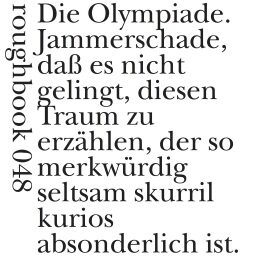Elke Erb
Gedichtverdacht
[Suspicion of Poem]
- roughbooks
- Basel 2019
- ISBN 978-3-90605-044-7
- 94 Pages
- Publisher’s contact details
Published in Greek with a grant from Litrix.de.
Sample translations
Suspect Determination
Erb owes her resilient determination at least in part to her biography. Born in a village in the Eifel mountains and raised in poverty during and after the war, the daughter of a literary historian moved to East Germany with her family at the age of 11 and had her share of opportunities there to show her mettle: alongside her work as a translator, her poems began to be the subjects of scandals as early as 1968, as did her advocacy for her fellow dissidents. She began to publish in West Germany in 1982, where she was awarded the Peter Huchel Prize in 1988, followed by many more prizes since then. Her books have been published by the Swiss publisher Urs Engeler since 1998, most recently in the appropriately idiosyncratic roughbooks series.
The title of her latest collection, "Suspicion of Poem", offers a glimpse of the procedure Erb has used for several years now: she "fetches" texts, notes, diary entries, and old ideas from her carefully managed archive – and this "fetching", as she explicitly insists, is itself a poetic gesture. Whether and to what degree the "fetched" material constitutes a poem remains uncertain, a matter of definition that is also up to the reader. The transitions are fluid, and so it is sometimes a matter of a "suspicion". But even just that is often inspiring enough.
Beyond that, Erb's approach leads her slim volume to include a wide range of types of texts: longer prose passages, tiny fragments of ideas, quotations, notes from conversations, dream protocols, and fully developed poems, sometimes with the poet's own commentary. All this plays out on a temporal axis from impressions of East Germany in 1970 to a morning meditation on chopped-down trees in the winter of 2018, with its striking ending: "They will outdie me. / The palms of my hands think: too bad about them." Entirely free of all confinement, classification, and judgment, these observations of self and world may be fragments, but they come together to form a flickering whole. "Anamorphosis" was the title of one of Elke Erb's early collections, a concept that this book, too, brings to mind.
The enormous challenge of translating experimental poetry is often confronted by its limits. But in the case of this book, at least, several factors relativize the problem: Erb rarely works with rhyme or other phonetic effects; she always remains very concrete semantically; and, no matter how uninhibited the movement of her imagination becomes, her devotion to reality always keeps her down-to-earth. This striking contrast is the basis of the appeal of her language, and this appeal can be effectively translated into a different idiom, with very little loss.
Translated by Andrew Shields

By Kristina Maidt-Zinke
Kristina Maidt-Zinke is a book and music critic at the Süddeutsche Zeitung and also writes reviews for Die Zeit.
Publisher's Summary
Elke Erb's latest collection of poetry begins with an older text, "The Olympiad", from 1970. Like all the texts in this book, it was "fetched from the diary" in the summer, which Erb always spends in the village of Wuischke in Upper Lusatia, and it has been published here for the first time: "A crying shame that I can't get the story of this dream across ..." The last poem, "The Thing with the Tree" from "12.12.18, six thirty", is dedicated to the trees: "They will outdie me. / The palms of my hands think: too bad about them." – From dream to tree along the thread of patience Erb has always followed to connect the most everyday and the most wonderful things. That is "poetry": "At breakfast with the two here in the country I suddenly said: / Somehow one is always eleven, and Geli: true, she is always 12. / Ah!"
(Text: roughbooks)
